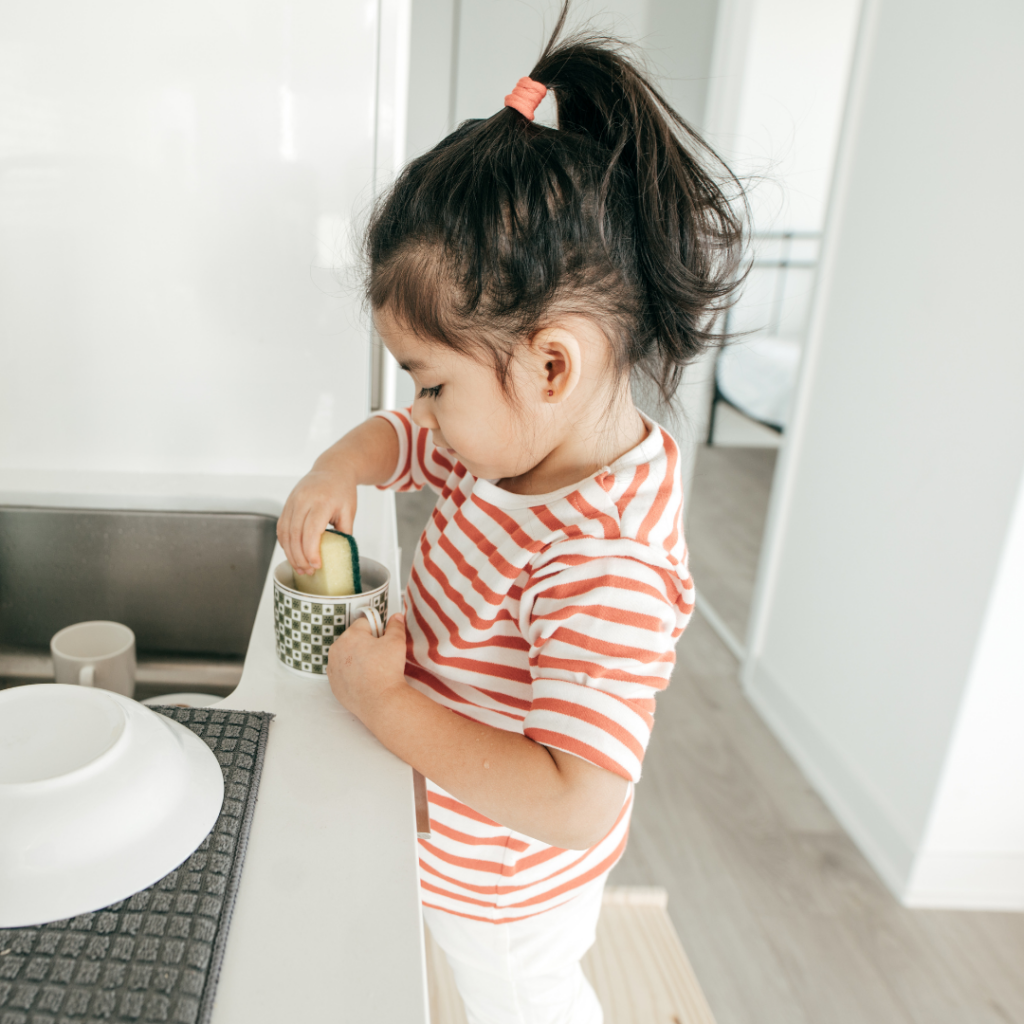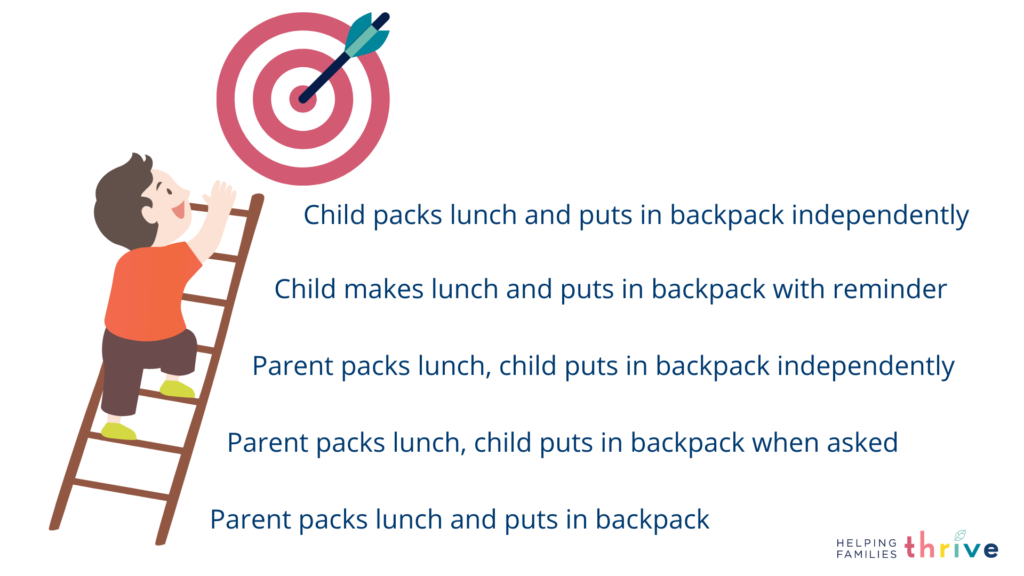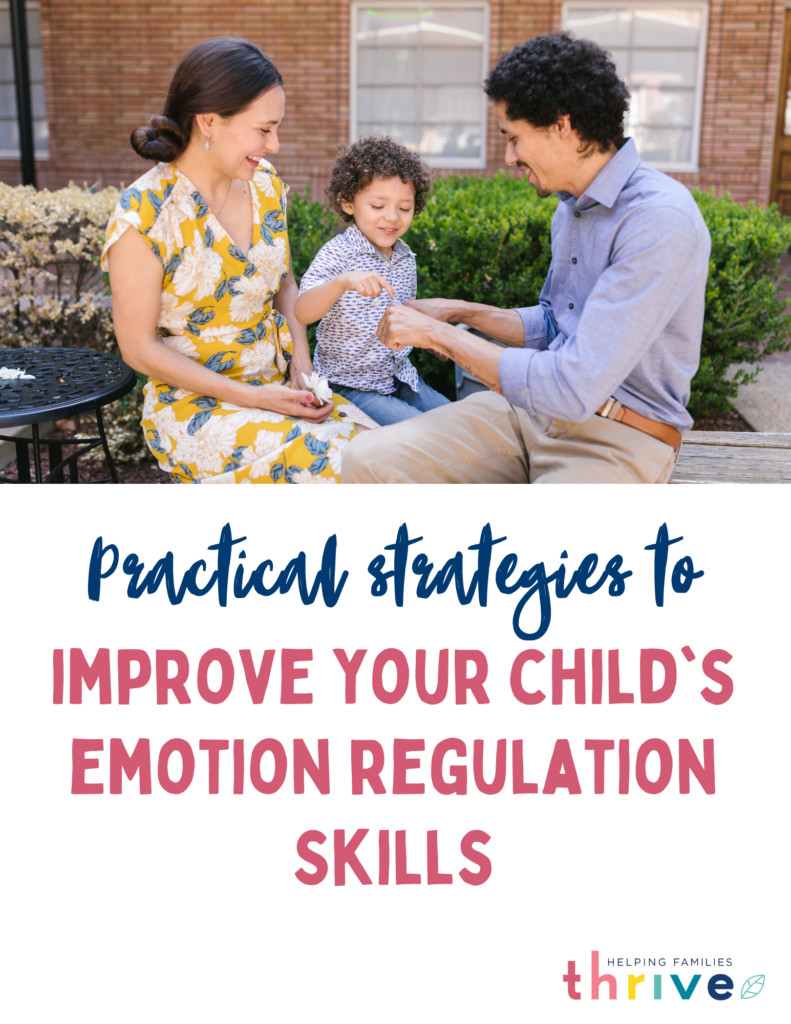
Gentle parent. Positive Parent. Free Range Parent. Conscious Parent. No matter what your parenting style or label is, most parents we work express sharing a common value: to raise resilient, capable children who contribute meaningfully to their family and community. As in most things, there is a lot of confusion how to go about achieving this goal. Should kids do chores? If so, how to actually get kids to do them?
Beware of the Parenting Pendulum
To navigate our way through the muck, it’s helpful to take a step back and understand how the swinging of the “parenting pendulum” is impacting parenting information (and misinformation) over time. In the midst of the modern “parenting wars” that dominate social media right now, parents often feel that expecting cooperation (or respect) is taboo. Sometimes it feels like any misstep in our wording or setting of a boundary may be irreversibly damaging our children!
In context, our wariness of harsh boundaries makes sense. We are recovering, evolving, and sometimes overcompensating from generations of “spare the rod spoil the child” parenting in which warmth could be hard to come by and boundaries were often more harsh than firm. Thanks to decades of research, we’ve learned that parenting styles that are high on control/boundaries but low on warmth (called the authoritarian parenting style in the research) has some significant shortcomings.
This information about what isn’t good for kids allows us as parents a wonderful opportunity for growth and evolution. However, as with many things, as we run away from the “old way” we can sometimes swing to the opposite extreme as we struggle to find a new path. In fact, as psychologists who work with families directly, our clinical work has shifted over the last few years. Previously, much of our work was helping parents find healthy replacements for spanking. However, recently we’ve had more situations where we are helping parents find a way to face their anxieties around setting firm boundaries and increasing expectations of their children.
It’s okay to have high expectations for kids
This new wave of parenting anxiety seems to result from pressure to be “purely positive” all the time. And even if parents recognize they need to set boundaries, the advice they’re seeing online about how to do so is often very rigid (i.e., if you do XYZ your child will feel abandoned or will be destined for unhealthy relationships). No wonder parents are feeling overwhelmed.
Decades of research has overwhelmingly found that a balance of warmth and boundaries lead to the strongest outcomes for children. This is called authoritative parenting. Our Essentials Course details how to achieve this balance according to the top evidence-based parenting interventions. How can we take this foundational tenant of child development and apply it to chores and raising responsible children? It’s easier said than done! Our busy parent brains throws so many thoughts at us that can get in our way.
In the midst of all this mental noise, we can me calmed by remembering what we know:
Healthy parenting is a balance of warmth and boundaries.
Kids should be kids. Yes. We can go overboard with chores and expectations. Yes. But let’s not let the pendulum swing too far. No need to assign push-ups when your child’s room isn’t spotless, but also no need to wait until they feel “intrinsically motivated” to take responsibility for anything in the home.
In fact, when it comes to instilling responsibility, a recent study of 10, 000 kindergarteners found that those who participated in more household chores performed better academically, emotionally and socially by the 3rd grade. Additionally, many cultures across the world have emotionally health children (with secure attachments) who participate heartily in family teamwork in the home.
So, let’s find some balance here together. Thankfully, there is flexibility in how we do this. We use the limited research we have as a guide, mix that with what you know about your kid and give it a go. Chores are not one-size-fits-all.
3 tools to promote responsibility
1. Create a culture of appreciation
Before we can even discuss chore charts or allowance, we need to back up a bit. Our first initiative is to build a culture of appreciation in our homes. What does this mean? First, it means to shift our mindset from “how to I get my child to comply with chores” to “how can I create an environment that facilitates helpfulness, responsibility, and mutual respect.”
One way we can do this is by using process-focused praise to acknowledge a job well done (or any baby step towards that), which has been shown to build intrinsic motivation. There’s an important concept in child development research called the attention principle. It essentially means that we will get more of what we pay attention to. Unfortunately, our attention is more easily drawn to “bad” behavior than it is to positive, helpful behavior. We notice and correct our kids when they haphazardly throw their coat the ground, but don’t say anything when they hang it up.
We have to be intentional about flipping this script.
What might this sound like?
- “Thank you for hanging your coat up. It’s really helpful when you do that.”
- “Thank you for listening when I asked you to clean up. The floor looks so nice now.”
- “That’s really nice of you helping your brother get his shoes on.”
When our kids feel noticed and valued for their contributions to the home, they’re going to be more willing to participate. Moreover, when the adults in the environment thank each other for their contributions in front of their children, a powerful culture of appreciation and teamwork is being modeled.
2. Avoid doing for
One of the best and easiest places to start when it comes to promoting responsibility is to assess what things you are doing for your child that they can actually begin to do for themselves. Especially when they’re little, our kids are reliant on us for so much! However, it’s easy to accidentally continue to do things for kids that they’re actually quite capable of doing themselves. Often, we continue to “help” because it’s easier and fast if we do it ourselves. But, all this “helping” can actually backfire.
Let’s take an example. For a 1-year-old who’s thirsty, it makes complete sense for the parent to grab the cup from the cupboard, fill it with water, and hand it to the child. However, this can easily turn into a parent doing this for years and years and years without even realizing their child can now learn to get their own water. Now, take a moment to review a typical day in your family. Are there moments that you’re stepping in too much? Are there things you do for you kids on autopilot that they may now be ready to learn?
Once you’ve identified some of those areas, when your child asks for help (or expresses frustration) try pausing before jumping in. What might this look like?
- If your child gets upset when building with Legos, pause and count to 10 before offering help. Often kids will work through their feelings without us intervening.
- When your child asks you do something try saying, “I’m happy to help. It looks like you are on your way to figuring it out! I’ll come back in just a minute to check on you and help out if you need it.”
3. Find the “just right” amount of support
Chores summary
We know from research that kids who participate in household chores show higher levels of self-competency and experience other benefits later on. Building a culture of appreciation, avoiding doing things for kids that they can do themselves, and finding the “just right” amount of help are simple ways parents can support this aim.
For additional tools, including a research-backed approach to chore charts and allowance, check out our recorded workshop: Raising Capable Kids.







10 Comments
Comments are closed.